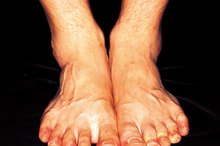Electrolyte Imbalance and Burning Urine
Electrolyte imbalances occur when the levels of electrolytes in your body either rise or fall to dangerous levels. Electrolytes include sodium, potassium, calcium and phosphorus. These imbalances might adversely affect kidney function and produce symptoms such as painful urination. Speak to your doctor about treating an electrolyte imbalance.
Features
If your body retains water or you suffer from an abnormal loss of electrolytes, such as sodium, phosphorus or calcium, you are at risk of suffering from kidney, or renal, disease. When you suffer from renal disease, your kidneys are unable to get rid of waste from the body properly. You might experience an increase in the need to go to the bathroom as well as a burning sensation during urination.
Identification
Normal Sodium & Potassium Blood Levels
Learn More
Hyponatremia is most often associated with renal disorders related to an electrolyte imbalance. During hyponatremia, you have a low level of sodium concentration in the blood. The water level in your body rises and causes excess fluid in the cells 1.
- Hyponatremia is most often associated with renal disorders related to an electrolyte imbalance.
- During hyponatremia, you have a low level of sodium concentration in the blood.
Considerations
When you suffer from dehydration, an electrolyte imbalance might occur. Dehydration occurs when your body does not have as much fluid as it should due to low fluid intake, vomiting, diarrhea and high fever. When you suffer from an electrolyte imbalance as a result of dehydration, your urine is highly concentrated. This can cause you to feel pain and burning when you urinate 1.
- When you suffer from dehydration, an electrolyte imbalance might occur.
- When you suffer from an electrolyte imbalance as a result of dehydration, your urine is highly concentrated.
Warning
Correct Liquid Intake With Lithium
Learn More
You will require medical treatment to stabilize the electrolyte imbalance. Once you have treated the electrolyte imbalance, the underlying problems, including pain during urination, will be relieved. If you still feel pain after treatment, speak to your doctor. You might be suffering from another medical condition, such as a bladder infection or sexually transmitted disease.
- You will require medical treatment to stabilize the electrolyte imbalance.
- Once you have treated the electrolyte imbalance, the underlying problems, including pain during urination, will be relieved.
Prevention/Solution
Treatment for an electrolyte imbalance will involve giving you fluids to restore the balance. If you do not have enough sodium in your blood, you may need to be given a saline solution through an IV. If dehydration has caused the electrolyte imbalance, you will either be given water to drink or through the IV.
Related Articles
References
- "Tabner's Nursing Care: Theory and Practice;" Elsevier Australia; 2008
- Braun MM, Barstow CH, Pyzocha NJ. Diagnosis and management of sodium disorders: hyponatremia and hypernatremia. Am Fam Physician. 2015;91(5):299-307.
- Braun MM, Barstow CH, Pyzocha NJ. Diagnosis and management of sodium disorders: hyponatremia and hypernatremia. Am Fam Physician. 2015;91(5):299-307.
- Balcı AK, Koksal O, Kose A, et al. General characteristics of patients with electrolyte imbalance admitted to emergency department. World J Emerg Med. 2013;4(2):113–116. doi:10.5847/wjem.j.issn.1920-8642.2013.02.005
- Balcı AK, Koksal O, Kose A, et al. General characteristics of patients with electrolyte imbalance admitted to emergency department. World J Emerg Med. 2013;4(2):113–116. doi:10.5847/wjem.j.issn.1920-8642.2013.02.005
- Lee JW. Fluid and electrolyte disturbances in critically ill patients. Electrolyte Blood Press. 2010;8(2):72–81. doi:10.5049/EBP.2010.8.2.72
- American Association for Clinical Chemistry. Basic metabolic panel. Updated December 2, 2015.
- El-Sherif N, Turitto G. Electrolyte disorders and arrhythmogenesis. Cardiol J. 2011;18(3):233-45.
- Prihantono P, Palinggi E, Haryasena H. Surgical treatment for parathyroid adenoma: a case report. Open Access Maced J Med Sci. 2019;7(15):2497–2501. doi:10.3889/oamjms.2019.418
- Joseph TT, DiMeglio M, Huffenberger A, Laudanski K. Behavioural patterns of electrolyte repletion in intensive care units: lessons from a large electronic dataset. Sci Rep. 2018;8(1):11915. doi:10.1038/s41598-018-30444-3
- Belval LN, Hosokawa Y, Casa DJ, et al. Practical hydration solutions for sports. Nutrients. 2019;11(7):1550. doi:10.3390/nu11071550
Writer Bio
Heather Topham Wood is a seasoned writer whose work has appeared in numerous publications, including USA Today, Gadgetell, Feel Rich and Step in Style. Heather is a published novelist with six Amazon bestsellers and a contract through Crescent Moon Press. She holds a bachelor's degree in English from TCNJ.









